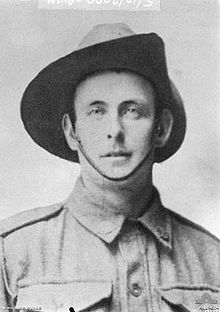Lewis McGee
| Lewis McGee | |
|---|---|

Lewis McGee
|
|
| Born |
13 May 1888 Campbell Town, Tasmania, Australia |
| Died | 12 October 1917 (aged 29) Passchendaele, Belgium |
| Buried at | Tyne Cot Cemetery |
| Allegiance | Australia |
| Service/branch | Australian Imperial Force |
| Years of service | 1916–17 |
| Rank | Sergeant |
| Unit | 40th Battalion |
| Battles/wars |
First World War |
| Awards | Victoria Cross |
First World War
Lewis McGee, VC (13 May 1888 – 12 October 1917) was an Australian recipient of the Victoria Cross, the highest decoration for gallantry "in the face of the enemy" that can be awarded to members of the British and Commonwealth armed forces. As a sergeant in the Australian Imperial Force, McGee was awarded the Victoria Cross for his actions in the Battle of Broodseinde—part of the Passchendaele offensive—on 4 October 1917. As his platoon came under heavy machine gun fire from a German pillbox, McGee rushed alone across open ground towards the emplacement. Armed solely with a revolver, he shot the gunners and captured the garrison. He then organised a bombing party, and led the group in the seizure of a second machine gun post.
Born in Tasmania, McGee gained employment as an engine driver with the Tasmanian Department of Railways. In March 1916, he enlisted in the Australian Imperial Force for service in the First World War. He was posted to the 40th Battalion, and completed training in Tasmania and the United Kingdom, where he was promoted to lance corporal. Transferring to the Western Front in November 1916, McGee was rapidly promoted to corporal then sergeant, and took part in the Battle of Messines. He was killed in action on 12 October 1917, eight days after his Victoria Cross exploit.
McGee was born in Campbell Town, Tasmania, on 13 May 1888, the youngest of eleven children to John McGee, a labourer and farmer, and his wife Mary (née Green). Three of McGee's sisters had died in infancy prior to his birth, and—when Lewis was aged only seven—his mother succumbed to pleurisy. Following his wife's death, John relocated his remaining family to a new farming property near Avoca. Here, Lewis gained employment as an engine driver with the Tasmanian Department of Railways. He also achieved a reputation as a "powerful athlete", particularly as a cyclist with the Avoca Cycling Club. On 15 November 1914, McGee married Eileen Rose Bailey; the couple had daughter Nada the following year.
...
Wikipedia
